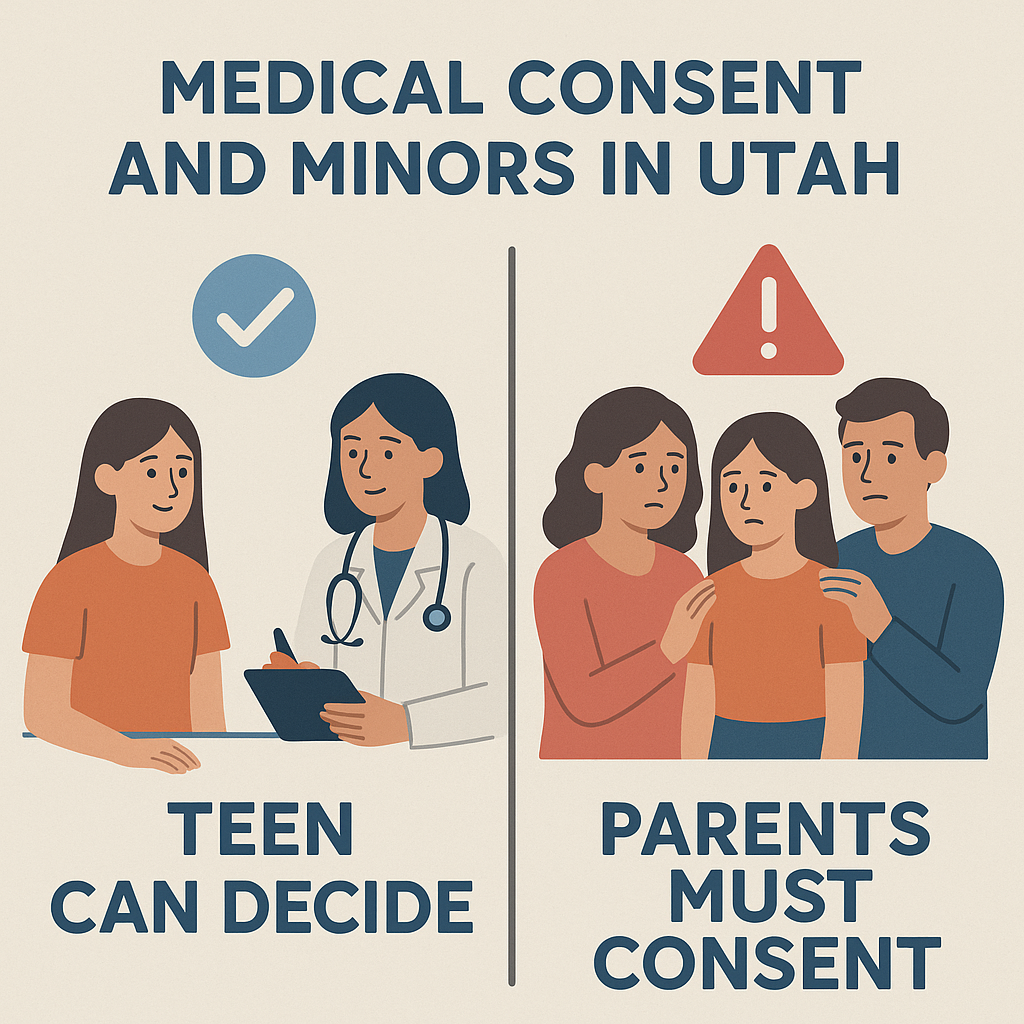Medical Consent and Minors in Utah When a Teen Can Decide and When Parents Must
Plain-English guide to Utah’s rules on teen consent, parental permission, privacy, and court involvement
This guide explains when minors in Utah can legally make their own medical decisions and when parents, guardians, or the courts must consent instead. Utah law recognizes that teens are developing independence, but it also protects families and providers through specific consent and privacy rules.
In some cases like emergencies, pregnancy care, or counseling, a teen can say “yes” to treatment without parental approval. In most others, a parent or guardian must still give consent before care begins. This article breaks down what’s required, what’s optional, and what happens when there’s disagreement.
Utah’s Age of Majority & Basic Consent Rules
In Utah, a person becomes a legal adult at 18. Until then, minors generally cannot give consent for medical treatment, and the law assumes parents or guardians are best suited to decide. There are important exceptions recognizing a minor’s ability to make certain choices independently.
When Minors Can Consent on Their Own
Utah law (Utah Code §26B-4-301) allows minors to consent to specific types of care without parental involvement in limited situations:
| Situation | Can the minor consent? | Key details |
|---|---|---|
| Emergency medical care | Yes | Doctors can treat immediately if delaying to contact parents would endanger life or cause serious harm. |
| Pregnancy care & reproductive health | Yes | Teens can consent to pregnancy tests, contraception, and prenatal care. Abortion laws have separate parental notice requirements. |
| STI testing & treatment | Yes | Minors may seek diagnosis and treatment for sexually transmitted infections. |
| Mental health counseling | Sometimes | Teens aged 16+ may request outpatient therapy without parental consent for a short period; longer-term therapy generally involves parents. |
| Substance use or detox treatment | Yes, to an extent | A minor can seek evaluation or detox care; ongoing treatment may later require parental consent. |
| Emancipated minors | Yes | Teens legally emancipated by a Utah court have full adult consent rights. See related links for more. |
When Parent or Guardian Consent Is Required
In nearly all other cases — routine checkups, prescriptions, surgeries, and hospital admissions — Utah requires parental consent. Providers typically need a signed consent form before giving treatment, except in emergencies.
If a parent refuses medically necessary treatment and that refusal puts the child’s health or life at serious risk, doctors may involve Child and Family Services or request a court order authorizing care.
Confidentiality & Privacy for Minors
Utah law balances a minor’s privacy with parental responsibility. Providers may keep certain information confidential if disclosure would discourage a teen from seeking care (for example, STI or contraception services). However, parents generally have access to a child’s medical records unless a specific statute limits disclosure.
HIPAA also plays a role: federal rules defer to Utah law in determining when minors control their own health information.
When Parents & Teens Disagree
Disputes can arise over vaccines, therapy, or treatment plans. When agreement isn’t possible and there’s concern about harm or neglect, courts may step in. A judge can grant temporary decision-making power to a provider, hospital, or appoint a guardian ad litem to act in the child’s best interest. For parenting-plan authority in Utah, see related links.
Emancipated Minors
An emancipated minor (usually age 16 or older) who has been granted emancipation by a Utah district court can consent to medical, dental, and mental health care just like an adult. This status is rare but legally recognized and removes the parent’s authority to consent.
Key Statutes & Legal References
Scenario Examples
- Emergency Room Visit. A 15-year-old is injured in a car crash and a parent can’t be reached. Doctors treat immediately — delaying consent would risk her life.
- Mental Health Counseling. A 17-year-old seeks therapy for anxiety. She can consent to short-term outpatient sessions; inpatient or long-term care usually requires a parent.
- Parental Refusal of Treatment. Parents refuse chemotherapy for a child’s treatable cancer. The hospital can petition the court, and a judge may order treatment to protect the child.
- Emancipated Teen. A 16-year-old granted emancipation signs for her own surgery. She may do so just like an adult.
Video & Social Learning Hub
YouTube: Minor Medical Consent Basics
Instagram: Quick Explainers
Key Takeaways
Adults at 18. Before that, parents usually must consent to care.
Teens may self-consent for emergencies, pregnancy care, STIs, some counseling, and limited detox.
Privacy can be protected in certain services; HIPAA defers to Utah law.
Courts can authorize treatment if refusal risks a child’s health or safety.
Emancipated minors have adult-level consent rights.
